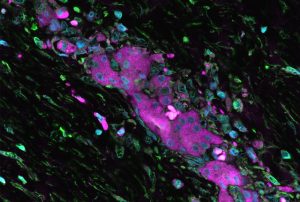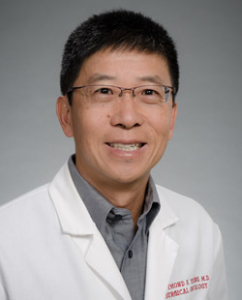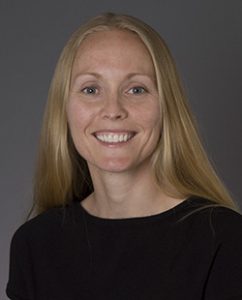Treatment target pinpointed for liver cancer in young adults
UW Medicine | Newsroom | July 3, 2019

Diseased liver sample from a fibrolamellar carcinoma patient shows tumor cells (pink) in the center surrounded by the fibrotic tissue (streaked with green) characteristic of FLC
Mitchell H. Omar

Dr. Raymond Yeung
New findings show how a genetically aberrant, fused protein promotes a rare form of liver cancer in adolescents and young adults. The researchers also saw that a certain mix of drugs could target the fused protein and the enzymes that it recruits. In the lab, this drug combination slowed down the uncontrolled growth of cells carrying the liver cancer mutation.
While the potential treatment approach needs further testing in animal models and in cancerous human liver cells, the early results are encouraging. This preliminary research project was published in eLife.

Dr. Kimberly J. Riehle
“There is a great need to improve treatment for patients with this form of liver cancer, called fibrolamellar carcinoma or FLC,” said John D. Scott, professor and chair of pharmacology at the University of Washington, who was the senior author on the paper.
The lead researchers were Rigney E. Turnham, who recently received her Ph.D. in pharmacology from the UW, and F. Donelson Smith, research assistant professor of pharmacology at the UW School of Medicine. The study involved several other scientists, and included a collaboration with Raymond S.W. Yeung, professor of surgery and founder of the Liver Tumor Clinic at UW Medical Center, and Kimberly J. Riehle, associate professor of surgery, Division of Pediatric Surgery and a Seattle Children’s Hospital surgeon. MORE
